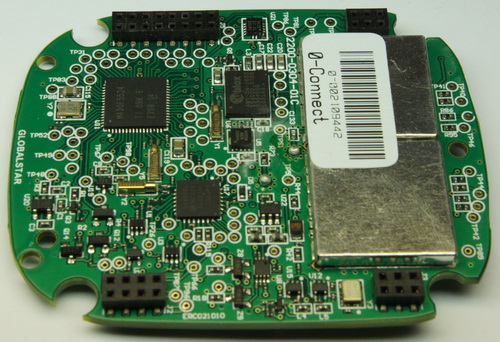The SPOT Connect is a pretty awesome device. Basically, with a clear view of the sky, you can transmit small amounts of data (like text messages or short tweets) across a low-orbit satellite network from nearly anywhere on earth. You can control the SPOT Connect messenger with simple serial commands. This is a great device if you find yourself stranded in the forest and your "Man vs. Wild" skills aren't up to snuff. They are a bit pricey ($150 for the hardware, $100 a year for the service, $20 for the breakout board, $0.10 per message) but that didn't stop SparkFun CEO Nate from taking one and completely dismantling it. Which brings us to today's post.
Nate created a great writeup all about his SPOT Connect teardown. In this tutorial, Nate takes the SPOT Connect and does a hefty bit of investigating. He breaks it into two parts: Part 1 covers the serial interface requirements while Part 2 covers the tear down and reverse engineering aspect of this project. Check out the tutorial to see what Nate discovered!







See SPOT run!
Why not just connect the arduino to the spot connect with bluetooth?
Power consumption, for one. Connected over bluetooth, when they're always going to be in the same enclosure, means you need to power two transceiver chipsets, plus the protocol overhead, etc. Additionally, by hooking it up this way, you have the ability to power the SPOT only when you need to send a message, again meaning you can leave it alone for a longer period of time.
Ease of testing and debugging is another reason. Because there are less communication steps involved, you can much more readily diagnose what the problem is. Using bluetooth means that if something's going wrong, you have to test each bluetooth transponder, plus the links between, each of which is a potential point of failure.
Yes, if you're going to be carrying it around, then using a bluetooth shield may be more useful, but at the same time, there are a lot of purposes where bluetooth would just be wasted mass.
These yaks won't shave themselves ;)
I would like to see a picture of an SFE employee shaving a yak.
For the love of God, be careful what you wish for...
If you read the tutorial, you'll notice the SPOT device carries an "Apple Security Chip". That's a likely clue that the bluetooth protocol is locked up pretty tight and probably involves encryption or some other kind of check to ensure only a genuine iPhone is connected.
Plus, this is a much nicer and more integrated solution.
That just means it is capable of talking to an Apple product. If you pair it with something else, then it won't use that chip at all. Even if you do though, it's not required to be encrypted unless the SPOT designers wanted to make it encrypted. The Apple protocol isn't anything too special anyway.
I'm glad to hear that. Apple is usually pretty strict with that
I was one of the two programmers on this product and developed the Bluetooth protocol for Android and Apple.
Nice to see this product on Sparkfun!
Ground based cell phone towers still have this won.
cellular technology is incredibly limiting.
If your a landlubber....arghhh.